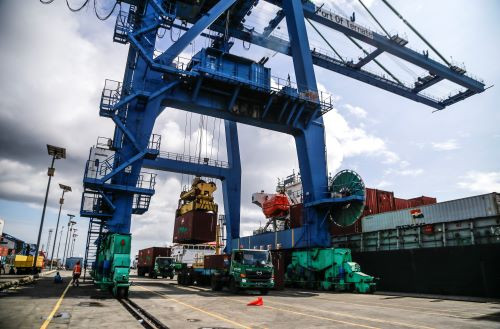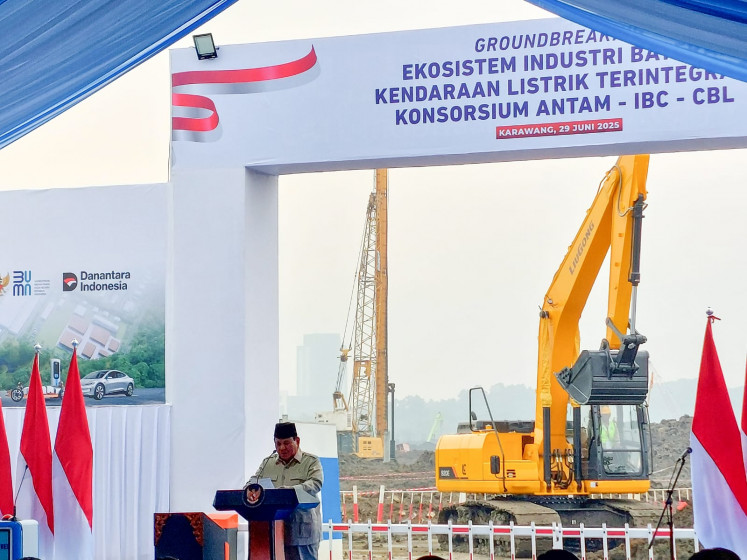Popular Reads
Top Results
Can't find what you're looking for?
View all search resultsPopular Reads
Top Results
Can't find what you're looking for?
View all search resultsConcerns loom over Jokowi's climate change resolve
Now that the National Reducing Emissions from Deforestation and Forest Degradation Agency (REDD+) has been abolished by President Joko âJokowiâ Widodo, calls are mounting for him to ensure the country achieves its target of reducing greenhouse gas emissions by 26 to 41 percent by 2019
Change text size
Gift Premium Articles
to Anyone

N
ow that the National Reducing Emissions from Deforestation and Forest Degradation Agency (REDD+) has been abolished by President Joko 'Jokowi' Widodo, calls are mounting for him to ensure the country achieves its target of reducing greenhouse gas emissions by 26 to 41 percent by 2019.
The REDD+ program in Indonesia was deemed critical to meeting that reduction target, as the burning of forests and peatlands accounts for more than 60 percent of the country's overall greenhouse gas
emissions.
Jokowi could extend the moratorium set by former president Susilo Bambang Yudhoyono's on the issuance of permits for primary forests and peatlands in areas designated as 'Conservation Forest', 'Protection Forest', 'Production Forest' and 'Other Uses of Land'.
However, Greenpeace Indonesia has said that on its own, an extension of the moratorium would be an inadequate response.
'Jokowi's commitment is clear [in extending the moratorium], but if we're looking at Yudhoyono's tenure, a mere extension is not enough if not backed up with a strengthening of the substance [of the moratorium]. This is what we haven't seen [from Jokowi],' Greenpeace Indonesia forest political campaigner Teguh Surya told The Jakarta Post.
He said that the current moratorium still lacked a strong legal foundation.
'The legal basis [for the moratorium] should also be strengthened because the moratorium was only stipulated in a presidential instruction [Inpres], not as policy. It should have been made a policy, or at least a decree,' Teguh said.
In addition to its weak legal standing, the current moratorium was also weakened by a lack of government monitoring, he added.
'For example, the spatial planning of Aceh does not refer to the moratorium map at all, which is clearly in violation of the presidential instruction,' said Teguh.
In 2013, the forestry ministry approved the Aceh administration's request to convert protected forest to non-forest zone through spatial planning bylaws.
With the environment ministry and the forestry ministry ' back before they were merged into a single ministry by Jokowi ' failing to monitor the implementation of the moratorium, now-defunct Presidential Working Unit for Supervision and Management of Development (UKP4) and the BP REDD+ decided to step in and conduct its own monitoring.
'If we look at the history of the moratorium, then the forest management that should have been done by the ministries was not done, which was why it was taken over by the UKP4 and the BP REDD+. So actually we were already on the right track [before the abolishment],' former UKP4 law enforcement deputy Achmad Santosa
said recently.
With both institutions dissolved in Jokowi's new government, the Environment and Forestry Ministry should make sure that the moratorium was monitored rigorously, Teguh said.
Achmad said the scope of the moratorium should also be widened to include all forest areas in the country.
'In the future, the government should also impose a moratorium on permits to convert land from protected forest to production forest,' he said.
Teguh added that the moratorium should also be imposed without a time-based deadline.
'It should not have a time limit. We are proposing a goal-based deadline, meaning that the sooner the goals [of the moratorium] are met, then the sooner the moratorium ends,' said Teguh.
On top of the moratorium, Teguh said Jokowi should reorient the government's development programs toward sustainability.
For example, Teguh said that the third phase of Indonesia's National Mid-Term Development Plan (RPJMN), commenced in 2015 and lasting until 2019, did not specify how Jokowi would address forest fires, which he vowed to tackle after studying the dried peatland and man-made canals that locals were building to prevent further drainage of peatlands in the Riau Islands in November of 2014.
'The translation of the commitment [into policy] is not found in detail in the RPJMN. The development plan is still catered quite heavily toward business,' he said.









